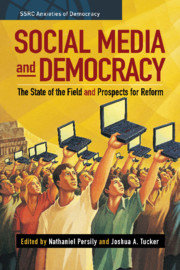Crossref Citations
This Book has been
cited by the following publications. This list is generated based on data provided by Crossref.
Grotto, AJ
and
Makridis, Christos
2020.
Perception of Digital Risks: Evidence from 54 Countries.
SSRN Electronic Journal ,
Henry, Emeric
Zhuravskaya, Ekaterina
and
Guriev, Sergei
2020.
Checking and Sharing Alt-Facts.
SSRN Electronic Journal ,
Foa, Roberto Stefan
and
Mounk, Yascha
2021.
America after Trump: from “clean” to “dirty” democracy?.
Policy Studies,
Vol. 42,
Issue. 5-6,
p.
455.
Saurwein, Florian
and
Spencer-Smith, Charlotte
2021.
Automated Trouble: The Role of Algorithmic Selection in Harms on Social Media Platforms.
Media and Communication,
Vol. 9,
Issue. 4,
p.
222.
Berriche, Manon
2021.
En quête de sources.
Politiques de communication,
Vol. N° 16,
Issue. 1,
p.
115.
Jacobides, Michael G
and
Lianos, Ioannis
2021.
Regulating platforms and ecosystems: an introduction.
Industrial and Corporate Change,
Vol. 30,
Issue. 5,
p.
1131.
Sussman, Kristen
2021.
Detecting Effects of Misinformation Through Emotion and Trace Behavior.
SSRN Electronic Journal ,
Matias, J. Nathan
Munger, Kevin
Le Quere, Marianne Aubin
and
Ebersole, Charles
2021.
The Upworthy Research Archive, a time series of 32,487 experiments in U.S. media.
Scientific Data,
Vol. 8,
Issue. 1,
Van Bavel, Jay J.
Harris, Elizabeth A.
Pärnamets, Philip
Rathje, Steve
Doell, Kimberly C.
and
Tucker, Joshua A.
2021.
Political Psychology in the Digital (mis)Information age: A Model of News Belief and Sharing.
Social Issues and Policy Review,
Vol. 15,
Issue. 1,
p.
84.
Asimovic, Nejla
Nagler, Jonathan
Bonneau, Richard
and
Tucker, Joshua A.
2021.
Testing the effects of Facebook usage in an ethnically polarized setting.
Proceedings of the National Academy of Sciences,
Vol. 118,
Issue. 25,
Rathje, Steve
Van Bavel, Jay J.
and
van der Linden, Sander
2021.
Out-group animosity drives engagement on social media.
Proceedings of the National Academy of Sciences,
Vol. 118,
Issue. 26,
Tong, Chau
Winckler, Haley
and
Rojas, Hernando
2021.
La conexión entre las percepciones de sesgos mediáticos y su influencia en la polarización afectiva: un examen en Brasil, México y Estados Unidos.
Revista de Comunicación Política,
Vol. 3,
Issue. 1,
p.
1.
Gilardi, Fabrizio
Gessler, Theresa
Kubli, Maël
and
Müller, Stefan
2021.
Social Media and Policy Responses to the COVID‐19 Pandemic in Switzerland.
Swiss Political Science Review,
Vol. 27,
Issue. 2,
p.
243.
Admati, Anat R
2021.
Capitalism, laws, and the need for trustworthy institutions.
Oxford Review of Economic Policy,
Vol. 37,
Issue. 4,
p.
678.
Idowu, Dare Leke
2022.
Digital activism and social change in Africa: motivations, outcomes and constraints.
Journal of Contemporary African Studies,
Vol. 40,
Issue. 4,
p.
526.
Kusche, Isabel
2022.
Private Voting, Public Opinion and Political Uncertainty in the Age of Social Media.
Zeitschrift für Soziologie,
Vol. 51,
Issue. 1,
p.
83.
Reuning, Kevin
Whitesell, Anne
and
Hannah, A. Lee
2022.
Facebook algorithm changes may have amplified local republican parties.
Research & Politics,
Vol. 9,
Issue. 2,
König, Tim
Schünemann, Wolf J.
Brand, Alexander
Freyberg, Julian
and
Gertz, Michael
2022.
The EPINetz Twitter Politicians Dataset 2021. A New Resource for the Study of the German Twittersphere and Its Application for the 2021 Federal Elections.
Politische Vierteljahresschrift,
Vol. 63,
Issue. 3,
p.
529.
Druckman, James N.
2022.
A Framework for the Study of Persuasion.
Annual Review of Political Science,
Vol. 25,
Issue. 1,
p.
65.
Assenmacher, Dennis
Weber, Derek
Preuss, Mike
Calero Valdez, André
Bradshaw, Alison
Ross, Björn
Cresci, Stefano
Trautmann, Heike
Neumann, Frank
and
Grimme, Christian
2022.
Benchmarking Crisis in Social Media Analytics: A Solution for the Data-Sharing Problem.
Social Science Computer Review,
Vol. 40,
Issue. 6,
p.
1496.



